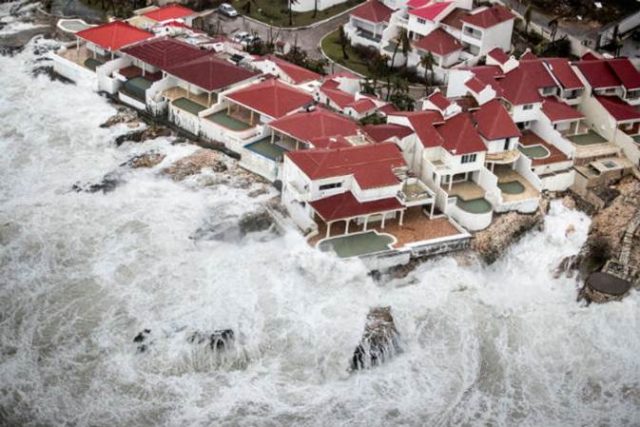Following the destruction of hundreds of small vessels, the sinking of a tug, the grounding of an oil platform, many other accidents and delays and re-routing of a large number of ships during Hurricanes Harvey and Irma so far, it is reported that global ports are at increasing risk from extreme weather events. Hurricane Harvey alone shut down Houston, Corpus Christi and a number of other ports along the Texas coast, and experts say that, if the maritime industry thought it was invulnerable to climate change, it’s time to think again. Meteorologists have already said that Harvey was the worst rain storm in US history, and that Irma is the most powerful Atlantic storm in recorded history.
Hurricane Irma is forcing some drastic changes to the itineraries of a significant number of cruise ships as it barrels towards the Caribbean and Florida coasts. In an unusual move yesterday, Norwegian Cruise Line said that it would bring its two Miami-based ships back home ahead of schedule to avoid the storm. Both the 2,004-passenger Norwegian Sky and 4,248-passenger Norwegian Escape will return to Miami from Caribbean trips on Thursday instead of Friday and Saturday. Norwegian also cancelled upcoming sailings of the two vessels that were scheduled to begin on Friday and Saturday. Several other lines including cruise giants Carnival and Royal Caribbean have re-routed ships that are supposed to be sailing in the Eastern Caribbean this week into the Western Caribbean. Royal Caribbean on Tuesday also cancelled two sailings to the Bahamas scheduled to begin on Friday aboard the 2,350-passenger Majesty of the Seas and the 2,446-passenger Enchantment of the Seas. The vessels are based in Port Canaveral, Fla., and Miami. The ships that have moved to the west include Royal Caribbean’s 5,400-passenger Allure of the Seas, which is one of the world’s three biggest cruise ships. Based in Fort Lauderdale, it had been scheduled to visit the Bahamas, Puerto Rico and St. Thomas, but instead, it is stopping in Mexico, Jamaica and Haiti.
Carnival has switched three vessels (the 2,974-passenger Carnival Glory, 3,690-passenger Carnival Magic and 3,004-passenger Carnival Splendor) from an Eastern Caribbean to a Western Caribbean itinerary for the week. The ships left their home bases of Miami, Port Canaveral and Fort Lauderdale, respectively, over the weekend. A fourth Carnival ship, the 2,124-passenger, Baltimore-based Carnival Pride, will visit Charleston, S.C. and Freeport and Nassau in the Bahamas this week instead of Grand Turk and Half Moon Cay. Irma also is affecting ships operated by MSC Cruises, Celebrity Cruises and Disney Cruise Line. MSC’s 3,502-passenger MSC Divina has diverted to the Western Caribbean from the Eastern Caribbean. Celebrity’s 2,850-passenger Celebrity Equinox is skipping calls in St. Thomas and Tortola, to be replaced by a stop in Curacao. Disney’s 2,500-passenger Disney Fantasy and 2,500-passenger Disney Dream are visiting ports in an altered order. In all, the changes are affecting the cruises of more than 40,000 vacationers. The moves come as the South Florida coast, which is home to two of the world’s biggest cruise hubs, appears increasingly threatened by the powerful Category 5 storm, which ballooned yesterday into the strongest hurricane ever recorded in the Atlantic Basin outside of the Caribbean Sea and Gulf of Mexico. Norwegian cited the storm’s potential impact to South Florida in announcing its plan to bring its ships home early and cancel the upcoming sailings. Irma is expected to affect more cruises scheduled to begin over the next few days. Royal Caribbean on Tuesday said it was evaluating the storm’s potential impact on five more sailings scheduled to begin over the coming weekend. The sailings include voyages of the world’s three largest cruise ships: Harmony of the Seas, Oasis of the Seas and Allure of the Seas. Many other commercial ships have been affected
Most ports, cities and related -infrastructure have not been built with climate change adaptation in mind. They could be protected by increasing the height of sea walls and dock gates to deal with sea level rise and storm surges, and accommodate by the retrofit and design of port facilities. In Canada, Montreal and Halifax ports are working on adaptation plans. The port of Los Angeles says improvements will ensure that it can cope with rising seas, while Rotterdam is being climate-proofed to deal with one-in-10,000-year storms.
Warm air carries more moisture. For every extra degree of warming, the atmosphere can hold 7% more moisture, making heavy rain more likely. A 2016 study in the journal Climatic Change underlines the problem: if the world warms fast, current once-a-century flooding could double in frequency by 2050. Whatever we do, it will come at a cost, but the point about tackling climate change now is that it will probably cost less than having to clean up the mess in the future.





